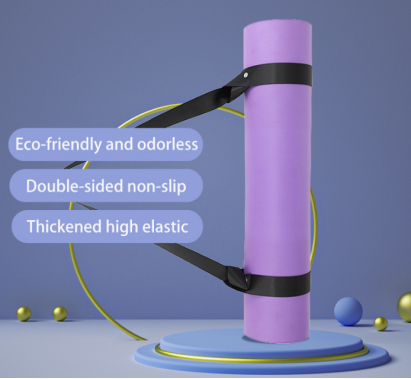Is your yoga mat safe?
If you have any product customization needs or ideas, MOQ 500, contact us.
Jun. 03, 2023

When customers prioritize both durability and sustainability in a yoga mat, TPE (thermoplastic elastomer) emerges as an excellent choice. TPE is gaining popularity as a material for yoga mats due to its eco-friendliness, safety, flexibility, and ease of manufacturing. It stands out as a sustainable option, as it can be produced using recycled materials, providing peace of mind to environmentally conscious individuals. Additionally, TPE boasts impressive attributes such as durability and resistance to wear and tear, ensuring a long-lasting and reliable yoga mat for practitioners.
TPE, short for thermoplastic elastomer, is a type of plastic that possesses both elastic and thermoplastic properties. This means that it can be easily stretched and molded when heated, and it will retain its original shape upon cooling.
TPE finds applications in various industries, including toys, footwear, and artificial limbs, due to its unique combination of softness, flexibility, and durability. It is also resistant to chemicals and can withstand extreme temperatures.
In recent years, TPE has gained significant popularity as a material for 3D printing. Its ability to produce intricate shapes and structures makes it highly desirable in the realm of additive manufacturing.
Overall, TPE stands out as one of the most versatile and adaptable plastics available today.
The problem with TPE is that it doesn't have a specified composition or list of "ingredients". So there is no way of knowing what a particular TPE product you buy contains.
TPE generally contains a mix of rubber, plastic, and various (and varying) other materials.
The BPF website explains some of the different grades of TPE in use.
But the fact that most manufacturers describe their TPE as "eco-friendly" without actually specifying the ingredients makes me skeptical about its credentials.
Thermoplastic Elastomers (TPE) are commonly used as a substitute for traditional rubber due to their enhanced durability and lack of color.
Compared to latex, TPE is generally less likely to trigger allergic reactions. However, there are concerns regarding the safety of TPE due to the presence of chemicals called phthalates.
Phthalates are added to TPE to improve its flexibility, but they have been associated with potential health risks such as hormone disruption, reproductive issues, and even cancer.
Nevertheless, it is important to highlight that TPE products typically contain low levels of phthalates, posing minimal risks to human health. As a result, TPE is legally accepted and generally considered safe for use.
Along with being easier to clean, TPE yoga mats offer other benefits, too. These benefits include:
Increased eco-friendliness
Improved elasticity
Recyclability
While TPE material has some characteristics of non-toxic, non-heavy, and non-PVC metal materials, which makes it is the ideal option for use at home or on the go.
Traditional PVC yoga mats aren't environmentally sustainable and PVC is one of the most polluting plastics.
For this reason, you should look at TPE mat or even a natural rubber yoga mat.
The Safety of TPE
When it comes to the safety of TPE (Thermoplastic Elastomer), the answer is not clear-cut. TPE is made from synthetic materials that have not undergone extensive human testing. However, most TPE products are free from well-known toxins such as dioxins, BPA, phthalates, lead, PVC, and other harmful chemicals.
The general consensus is that TPE is considered a relatively safe material. However, the safety of TPE is still a topic of debate, as there is limited concrete evidence supporting its safety or potential risks. Despite this ongoing discussion, TPE materials and products come into contact with people in various everyday applications.
TPE is commonly used in items such as soft spoons for babies, grips on tool handles, seals or liners on soda bottle caps, and sealing rings on car components. While TPE is likely harmless, the ultimate decision on its safety is a personal one that you need to make for yourself.
Search Blog
New Products
E-mail: planning@shzhensheng.com
Mob.: +86 138 0168 6978
Tel.: +86 21 5204 8758
Add.: Room 203, Building 1, No. 423 Wuning Road, Putuo district, Shanghai 200063, China
Navigation
Get in touch
seoKeywords: custom size yoga mat custom logo yoga mat custom Rubber Pilates Yoga Mat eco friendly rubber yoga mat custom Pilates Yoga Mat TPE Rubber Professional Yoga Mat rectangle yoga mat tpe comfortable tpe yoga mat comfortable tpe yoga mat Customize nbr yoga mat custom round yoga mat round yoga mats wholesale eco friendly yoga mats wholesale non slip yoga mat wholesale Customize non slip yoga mat wholesale ankle weights wholesale custom round yoga mat round yoga mats wholesale personalized soccer ball size 5 personalized soccer ball size 4 Thermo Bonded Football Machine Stitched Football custom resistance bands wholesale wholesale resistance bands with logo custom printed resistance bands custom logo resistance bands custom size resistance bands custom length resistance bands custom ankle weights ankle weights cost ankle weights cost buy ankle weights custom balance board surf balance board oem yoga mat yoga mat factory yoga mat manufacturer tpe yoga mat manufacturer private label yoga mats